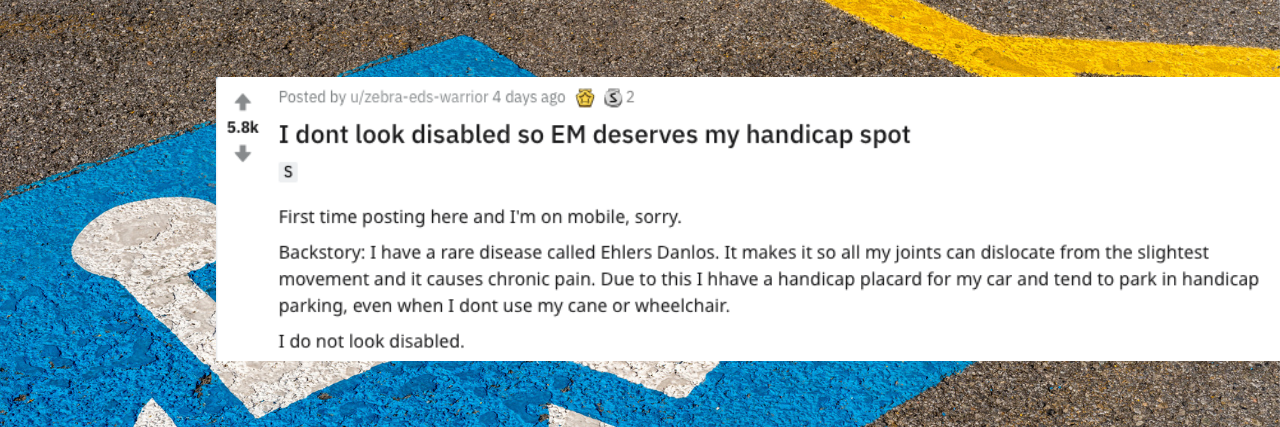On June 7, Reddit user u/zebra-eds-warrior posted about an unpleasant encounter with a woman at a local Walmart over a disabled parking spot. U/zebra-eds-warrior, who revealed she has Ehlers Danlos syndrome (EDS), felt bullied into party tricks to “prove” her disability to park in the accessible spot, despite having a disability placard.
• What is Ehlers-Danlos Syndrome?
• What Are Common Ehlers-Danlos Syndrome Symptoms?
In the Reddit thread r/entitledparents, user u/zebra-eds-warrior described a recent shopping trip. The parking lot was “stuffed like seams are about to burst,” but she found one accessible parking spot and pulled in with her placard up. Then another woman, who u/zebra-eds-warrior identifies as “Em” in her post, challenged u/zebra-eds-warrior for the spot.
“A lot of times people ask … if the placard’s mine and [I] just shut them down once and they leave me alone,” u/zebra-eds-warrior shared in her Reddit post. She said this encounter was different. U/zebra-eds-warrior outlined the rest of incident:
Em: That’s my SPOT! (in a whiny voice you hear little kids use)
Me: I got here first, plus I need to be close to the store. I had just gotten out of my car and hadn’t even closed the door yet.
Em: Get back in and move! Your not disabled so it is my spot! I saw it first! She is screaming this from her car with her kids in it.
Me: No! I have the placard and I AM disabled.
Em: Your not old or *insert r word I refuse to use. So therefore not disabled!
She kept blocking me when I would try and get in the store.
Me: Listen lady! Want to see how disabled I can be? Watch this!
I then show off my circus like tricks of dislocating my shoulders and wrists moving them around in unnatural ways.
Em: screaming. How dare you! You… you… freak!
All the while I continued walking closer to her car.
She drove away, scared out of her mind.
EDS is a genetic condition that affects the collagen or connective tissues in your body, from your joints, ligaments and tendons to your skin and organ tissues. Many with EDS have loose joints that often dislocate easily, even during everyday activities like picking up a basket of groceries. These dislocations, like many of the symptoms of EDS, cause chronic pain.
U/zebra-eds-warrior explained in her post she didn’t show the insistent woman how much she could dislocate her joints for fun but because she felt forced to do so. “I CAN self dislocate but it causes a lot of pain but I did it as I felt I had no other choice to get the EM to leave me alone,” she said.
She also described a frustration common to many who live with invisible disabilities or chronic illnesses, and don’t necessarily “look” sick. Not only did u/zebra-eds-warrior experience this in the parking lot, but she said the misunderstanding and invalidation of her invisible disability can happen almost anywhere — including at the doctor’s office.
“It can be hard because people expect you to be able to do everything a ‘normal’ healthy person can,” u/zebra-eds-warrior told The Mighty. She continued:
I’ll go into a store not in my chair and someone will ask me to help life something heavy and will get mad when I say I can’t. Doctors are an issue too. It took 17 years to get my diagnosis, not because of lack of symptoms, but because I looked healthy so they did not take me seriously. They thought I was faking or because I am a woman I was being hysterical. Those are actual terms they used to describe me at times. One wanted to put me on antipsychotics because that was the only explanation for my symptoms. People look at you like you are the picture of health, but you’re not and because you don’t fit the mold of disabled and their picture you obviously can’t be.
Since posting on Reddit, u/zebra-eds-warrior shared the response has been primarily positive. She has encountered some comments that led her to educate other Reddit users Ehlers Danlos Syndrome dislocations are not for fun. She also noted people need to have more awareness about invisible illness, without interrogating strangers about their personal health history details.
“People feel they have a right to know all the details of your life when you’re disabled and they don’t,” she said, adding:
Just because I don’t fit the mold people don’t believe me and want to intrude into my life about that. No one should have the entitlement or feel the right to do so. Just because I am a young woman does not mean I cannot be disabled. Stereotypes need to be broken and people need to be more educated on invisible disabilities or else we are going to stay stuck in a world of people screaming at us and telling us what we are and aren’t.
Can you relate? Share your experiences in the comments below. For more about living with an invisible illness, check out of the following Mighty stories that have helped others in the EDS community:
Header image via Marc Bruxelle/Getty Images

